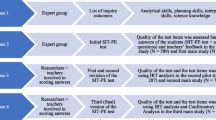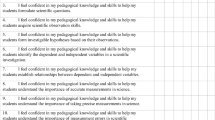Abstract
Various inquiry approaches have been promoted in science classrooms as a way for students to engage in, and have a deeper understanding of scientific discourse. However, there is a paucity of empirical evidence to suggest how children’s actions and engagement in these approaches, or practical epistemologies (Sandoval, Science Education 89(4): 634–656, 2005), may contribute to the development of their personal epistemologies, or their views about the nature of knowledge and knowing and the nature of learning. This paper puts forth the conceptualization and development of the Practical Epistemology in Science Survey (PESS) instrument, a 26-item Likert-scale self-assessment which measures how students view their individual and social participation in the classroom scientific community. Data were collected from 4th–6th-grade students (n = 1019) in the USA and a psychometric evaluation of the reliability, validity, and dimensionality of the instrument was conducted. The Cronbach’s alpha value indices for all subsets of items of the PESS suggest a strong reliability of the instrument (α ≥ .80). The development of the PESS may be useful in science education research to (a) detect changes to students’ beliefs about knowledge and knowledge development; (b) identify dispositions and beliefs which may or may not be in line with the aims and values of various pedagogical approaches; (c) monitor the process of change, e.g., time it takes for students to change their approaches and beliefs with respect to teacher practice; and, (d) overall, to provide an understanding of how students’ formal epistemologies are developed and informed by the affordances in science classrooms.




Similar content being viewed by others
References
Akkus, R., Gunel, M., & Hand, B. (2007). Comparing an inquiry based approach known as the science writing heuristic to traditional science teaching practices: Are there differences? International Journal of Science Education, 29, 1745–1765.
Bassesches, M. A. (1994). Dialectical thinking and adult development. Norwood: Ablex.
Borda, E. (2007). Applying Gadamer’s concept of disposition to science and science education. Science & Education, 16(9), 1027–1041. doi:10.1007/s11191-007-9079-5.
Cattell, R. B. (1966). The scree test for the number of factors. Multivariate Behavioral Research, 1(2), 245–276.
Chinn, C. A., Buckland, L. A., & Samarapungavan, A. (2011). Expanding the dimensions of epistemic cognition: Arguments from philosophy and psychology. Educational Psychologist, 46(3), 141–167. doi:10.1080/00461520.2011.587722.
Colucciello, M. L. (1999). Relationship between critical thinking and learning styles. Journal of Professional Nursing, 15, 294–301.
Conley, A. M., Pintrich, P. R., Vekiri, I., & Harrison, D. (2004). Changes in epistemological beliefs in elementary science students. Contemporary Educational Psychology, 29, 186–204.
Cronbach, L. J. (1951). Coefficient alpha and the internal structure of tests. Psychometrika, 16(3), 297–334.
Dewey, J. (1933). How we think. Boston: D.C.Heath & Co..
Driver, R., Leach, J., Millar, R., & Scott, P. (1996). In Driver R. (Ed.), Young people's images of science. Open University Press.
Dunn, T. J., Baguley, T., & Brunsden, V. (2014). From alpha to omega: A practical solution to the pervasive problem of internal consistency estimation. British Journal of Psychology, 105, 399–412. doi:10.1111/bjop.12046.
Duschl, R. (2008). Science education in three-part harmony: Balancing conceptual, epistemic, and social learning goals. Review of Research in Education, 32(1), 268–291. doi:10.3102/0091732X07309371.
Duschl, R., Maeng, S., & Sezen, A. (2011). Learning Progressions and teaching sequences: a review and analysis. Studies in Science Education, 47(2), 123–182.
Elder, A. D. (1999). An exploration of fifth-grade students’ epistemological beliefs in science and an investigation of their relation to science learning
Elder, A. (2002). Characterizing fifth grade students’ epistemological beliefs in science. Personal Epistemology: The Psychology of Beliefs about Knowledge and Knowing, 347–364.
Facione, P. A. (2000). The disposition toward critical thinking: Its character, measurement, and relationship to critical thinking skill. Informal Logic, 20(1), 61–84.
Falk, J. H., Storksdieck, M., & Dierking, L. D. (2007). Investigating public science interest and understanding: Evidence for the importance of free-choice learning. Public Understanding of Science, 16(4), 455–469.
Fan, X., Thompson, B., & Wang, L. (1999). Effects of sample size, estimation method and model specification on structural equation modeling fit indexes. Structural Equation Modeling, 6, 56–83.
Gadamer, H. G. (1947). On the primordiality of science: a rectoral address. In D. Misgeld & G. Nicholson (Eds.), Hans-Georg Gadamer on education, poetry and history: applied hermeneutics. Albany: State University of New York Press.
George, D., & Mallery, M. (2003). Using SPSS for windows step by step: A simple guide and reference.
Gunel, M., Akkus, R., & Ozer-Keskin, M. (2011) Implementing the Argumentation Based Science Learning Approach in Middle School Setting Through Professional Development Programs and Investigating the Impact of The Approach on Teachers’ Pedagogy and Students’ Academic Achievements, Skills and Perceptions Toward Science. Paper presented at the annual meeting of the European Science Education Research Association (ESERA), Lyon, France.
Guttman, L. (1945). A basis for analyzing test-retest reliability. Psychometrika, 10, 255–282.
Hammer, D., & Elby, A. (2002). On the form of a personal epistemology. In B. K. Hofer, D. Hammer, & A. Elby (Eds.), Personal epistemology: The psychology of beliefs about knowledge and knowing (pp. 169–190). Mahwah: Erlbaum.
Hand, B., & Keys, C. (1999). Inquiry investigation. The Science Teacher, 66(4), 27–29.
Hand, B., & Norton-Meier L. (Eds.) (2011). Voices from the classroom: Elementary teachers’ experience with argument based inquiry. Sense Publishers: Amsterdam.
Henson, R. K., & Roberts, J. K. (2006). Use of exploratory factor analysis in published research: Common errors and some comment on improved practice. Educational and Psychological Measurement, 66, 393–416.
Hofer, B. K., & Pintrich, P. R. (Spring 1997). The development of epistemological theories: Beliefs about knowledge and knowing and their relation to learning. Review of Educational Research, 67(1), 88–140. doi:10.3102/00346543067001088.
Horn, J. L., & Engstrom, R. (1979). Cattell’s Scree Test In Relation To Bartlett’s Chi-Square Test And Other Observations On The Number Of Factors Problem. Multivariate Behavioral Research, 14, 283–300.
Iordanou, K. (2010). Developing argument skills across scientific and social domains. Journal of Cognition and Development, 11(3), 293–327. doi:10.1080/15248372.2010.485335.
King, P. M., & Kitchener, K. S. (1994). Developing reflective judgment: Understanding and promoting intellectual growth and critical thinking in adolescents and adults. jossey-bass higher and adult education series and jossey-bass social and behavioral science series. San Francisco: Jossey-Bass Publishers.
Kuhn, D. (1991). The skills of argument. Cambridge University Press.
Kuhn, D., & Weinstock, M. (2002). What is epistemological thinking and why does it matter? In B. K. Hofer & P. R. Pintrich (Eds.), Personal epistemology: The psychology of beliefs about knowledge and knowing (pp. 121–144). Mahwah: Lawrence Erlbaum Associates Publishers.
Kuhn, D., Zillmer, N., Crowell, A., & Zavala, J. (2013). Developing norms of argumentation: Metacognitive, epistemological, and social dimensions of developing argumentive competence. Cognition and Instruction, 31(4), 456–496.
Ledesma, R.D. & Valero-Mora, P. (2007). Determining the number of factors to retain in EFA: An easy-to-use computer program for carrying out parallel analysis. Practical Assessment, Research & Evaluation, 12(2). Retrieved from: http://pareonline.net/getvn.asp?v=12&n=2.
Lee, M., Johanson, R. E., & Tsai, C. (2008). Exploring taiwanese high school students’ conceptions of and approaches to learning science through a structural equation modeling analysis. Science Education, 92(2), 191–220.
Lehrer, R., Schauble, L., & Lucas, D. (2008). Supporting development of the epistemology of inquiry. Cognitive Development, 23(4), 512–529.
McDonald, R. P. (1999). Test theory: A unified treatment. Mahwah: L. Erlbaum Associates.
Nam, J., Choi, A., & Hand, B. (2011). Implementation of the Science Writing Heuristic (SWH) approach in 8th grade science classrooms. International Journal of Science and Mathematics Education, 9, 1111–1133. doi:10.1007/s10763-010-9250-3.
National Research Council. (2007). In Committee on Enhancing Professional Development for Teachers, National Academies Teacher Advisory Council, Center for Education, Division of Behavioral and Social Sciences and Education. (Ed.), Enhancing professional development for teachers: Potential uses of information technology. Report of a workshop. Washington, D.C.: The National Academies Press. Retrieved from http://www.nap.edu/openbook.php?record_id=11995&page=R1
National Research Council. (2011). A framework for K-12 science education: Practices, crosscutting concepts, and core ideas. Washington, D.C.: National Academy of Sciences.
Nunnally, J. C. (1978). Psychometric theory (2nd ed.). New York: McGraw-Hill.
Pease, M. A., & Kuhn, D. (2011). Experimental analysis of the effective components of problem-based learning. Science Education, 95(1), 57–86.
Profetto-McGrath. (2003). The relationship of critical thinking skills and critical thinking dispositions of baccalaureate nursing students. Journal of Advanced Nursing, 43, 569–577. doi:10.1046/j.1365-2648.2003.02755.x.
Revelle, W., & Zinbarg, R. E. (2009). Coefficients Alpha, Beta, Omega, and the glb: Comments on Sijtsma. Psychometrika, 74(1), 145–154. doi:10.1007/S11336-008-9102-Z.
Sandoval, W. A. (2005). Understanding students’ practical epistemologies and their influence on learning through inquiry. Science Education, 89(4), 634–656. doi:10.1002/sce.20065.
Schommer, M. (1990). Effects of beliefs about the nature of knowledge on comprehension. Journal of Educational Psychology, 82, 498–504.
Schommer, M. (1993). Epistemological development and academic performance among secondary students. Journal of Educational Psychology, 85(3), 406–411.
Schraw, G., Bendixen, L. D., & Dunkle, M. E. (2002). Development and validation of the epistemic belief inventory (EBI).
Vygotsky, L., & Cole, M. (1978). Mind in Society. Boston: Havard Unversity Press.
Wood, P., & Kardash, C. (2002). Critical elements in the design and analysis of studies of epistemology.
Zinbarg, R. E., Revelle, W., Yovel, I., & Li, W. (2005). Cronbach’s α, Revelle’s β, and Mcdonald’s ωH: their relations with each other and two alternative conceptualizations of reliability. Psychometrika, 70(1), 123–133. doi:10.1007/s11336-003-0974-7.
Zinbarg, R. E., Yovel, I., Revelle, W., & McDonald, R. P. (2006). Estimating generalizability to a latent variable common to all of a scale’s indicators: A comparison of estimators for ω h. Applied Psychological Measurement, 30(2), 121–144. doi:10.1177/0146621605278814.
Zinbarg, R. E., Revelle, W., & Yovel, I. (2007). Estimating omega h for Structures Containing Two Group Factors: Perils and Prospects. Applied Psychological Measurement, 21(2), 135–157.
Acknowledgements
The research reported here was supported by the Institute of Education Sciences, US Department of Education, through grants R305A090094 and R305B10005 to The University of Iowa. The opinions expressed are those of the authors and do not necessarily represent the views of the Institute or the US Department of Education.
Author information
Authors and Affiliations
Corresponding author
Rights and permissions
About this article
Cite this article
Villanueva, M.G., Hand, B., Shelley, M. et al. The Conceptualization and Development of the Practical Epistemology in Science Survey (PESS). Res Sci Educ 49, 635–655 (2019). https://doi.org/10.1007/s11165-017-9629-z
Published:
Issue Date:
DOI: https://doi.org/10.1007/s11165-017-9629-z




